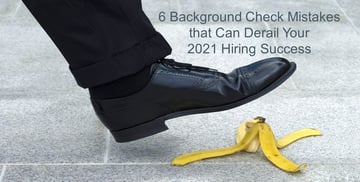![]()
 HR Professionals know just how important education can be as a foundation for shaping a qualified employee. There are many positions where a bachelor’s, master’s, or PhD. is imperative when choosing the person to fill it.
HR Professionals know just how important education can be as a foundation for shaping a qualified employee. There are many positions where a bachelor’s, master’s, or PhD. is imperative when choosing the person to fill it.
Unfortunately, this requirement can turn people into, well, truth-stretchers.
Education is one of the biggest areas where job applicants fudge or completely fabricate information on their resumes and applications. Maybe they lack a few hours from getting their degree, or maybe they never even stepped foot in one single class!
It’s crucial for HR professionals to drill down into the information the candidate provides and verify important pieces, such as education, with a background check. Otherwise, employers are opening themselves up to hiring unqualified, or even dangerous, people that could be detrimental to the company.
Cost of a Bad Hire
Truth About Diploma Mills
One way applicants misrepresent their education background is with diploma mills. To put it simply, the truth about Diploma Mills is that they are mostly online entities that offer substandard or bogus degrees in exchange for payment and not much else.
These degrees are obtained with little or no work involved outside of signing a, sometimes hefty, check. How is it possible for the applicants to be competent at their jobs?
This concept is nothing new.
A Brief History
- 1998 – Brooklyn, NY – A high school principal created a website to offer fake grades, no-work classes and modified regents exam results.
- 2003 – North Carolina – Manslaughter Malpractice Laurence Perry kills and 8-year-old with a lethal dose of insulin. Perry was a diploma mill ‘doctor.’
- 2005 – The U.S. Department of Education launched a database to include the names, addresses and enrollment of all schools with recognized accreditation.
What is the Difference Between an Accredited Institution and a Diploma Mill?
The best bet is for the applicant to have earned a degree from an accredited institution. This is the most widely accepted educational standard by other institutions and employers.
There are six regional accreditation agencies recognized by the Department of Education:
New England Association of Schools and Colleges (NEASC). Accredits schools in Connecticut, Maine, Massachusetts, New Hampshire, Rhode Island, Vermont, Europe, Africa, Asia, and the Middle East.
North Central Association Commission on Accreditation and School Improvement (NCA.) Accredits schools in Arizona, Arkansas, Colorado, Illinois, Indiana, Iowa, Kansas, Michigan, Minnesota, Missouri, Navajo Nation, Nebraska, New Mexico, North Dakota, Ohio, Oklahoma, South Dakota, West Virginia, Wisconsin, and Wyoming.
Middle States Association of Schools and Colleges (MSA). Accredits schools in Delaware, District of Columbia, Maryland, New Jersey, New York, Pennsylvania, Puerto Rico, U.S. Virgin Islands, Central America, Europe, and the Middle East.
Southern Association of Schools and Colleges (SACS). Accredits schools in Alabama, Florida, Georgia, Kentucky, Louisiana, Mississippi, North Carolina, South Carolina, Tennessee, Texas, Virginia, and Latin America.
Western Association of Schools and Colleges (WASC). Accredits schools in California, Hawaii, Guam, American Samoa, Palau, Micronesia, Northern Marianas, Marshall Islands, and other Australasian locations.
Northwest Association of Schools and Colleges (NWCCU). Accredits schools in Alaska, Idaho, Montana, Nevada, Oregon, Utah, and Washington.
Warning Signs that a college is a Diploma Mill
There is no phone number on the college website.
The name of the college is foreign.
The institution employs aggressive sales tactics. Legitimate institutions, including distance learning programs, don’t advertise through spam or pop-ups or use high-pressure telemarketing calls.
They charge a flat fee. Legitimate colleges charge by the credit, course, or semester, not a flat fee for an entire degree.
They offer accelerated programs. If the institution claims you can earn a degree in a few days, weeks or months, it is likely a diploma mill.
Tips employers can use to see if a particular institution is legitimate
- Call the registrar’s office of a local college or University and ask if it would transfer credits from the referenced college or university in question.
- Contact your state attorney general’s office to make sure the school is operating legally.
The Cost of Fake Degrees
Not catching a diploma mill “degree” can cost companies big in several different ways.
Turnover: When the unqualified person doesn’t work out, HR must shell out additional resources for recruiting and training a person to take his place.
Client losses: If the person claims to have a degree, but cannot perform adequately, he or she could make mistakes that cause clients to leave. This cost is practically unmeasurable.
A tarnished reputation: If the business practice suffers because of an unqualified employee, word can spread. A once great reputation could fall to mediocre or subpar levels that could take years to turn around.
Litigation. If the unqualified person hurts or kills someone due to negligence, or damages property because of lack of skill, his or her employer could be found liable and subject to steep restitution.
How Your Background Screening Company Helps
Your Background Screening partner should use licensed private investigators to contact the school’s registrar’s office to obtain verification.
Data Facts recommends verifying at least the highest degree completed. The last name of the applicant at the time they attended school is needed to obtain the verification.
Other information verified may be:
- School attended
- Dates of attendance
- Field of study
- Degree earned - if any
- Date of graduation or last attendance
HR Professionals must be aware of “diploma mills” that grant worthless degrees, and be adept at spotting them during the hiring process. Your background screening provider should offer a compliant process to verify if a school has been accredited, and then will proceed to look at diploma mills.
Keep in mind, if a school cannot verify data, the consumer should be given an opportunity to explain before assuming they have lied since there can be an explanation for discrepancy.
Understanding the truth about diploma mills and how they operate operate helps HR professionals go a long way toward ensuring each employee indeed has the education he or she is claiming, and is qualified for the position in question.
Other posts you might be interested in
View All Posts
5 Background Check Mistakes that Can Derail Your 2021 Hiring Success
Read More
They're Heeeere! The No-Holds-Barred Truth About Hiring Gen Z
Read More
